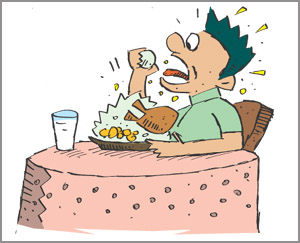Similes - colourful phrases which make ideas clearer
 Do
you know what a simile is? We use similes so often in our daily
conversations, that we don't think about them. If someone says "their
child is like a stick", at once we picture (see a mental image), a very
thin child. A man who is "like a lamppost" is very thin and tall.
Grandfather's hair is "like cotton wool." It rained for an hour and the
road was "like a river" are sentences with similes. Do
you know what a simile is? We use similes so often in our daily
conversations, that we don't think about them. If someone says "their
child is like a stick", at once we picture (see a mental image), a very
thin child. A man who is "like a lamppost" is very thin and tall.
Grandfather's hair is "like cotton wool." It rained for an hour and the
road was "like a river" are sentences with similes.
Like a stick, like a lamppost, like cotton wool and like a river are
all similes. They are phrases used to make an idea clear or forceful by
comparing with something that the listener or reader is familiar with.
When the road is compared to a river, we know exactly the state of the
road after the rain.
If a man says, "I ate like a pig", his thought is more forcefully
expressed than if he had simply said, "I ate too
|

Proud as a peacock
|
much." Pigs are noted for eating anything and everything all
the time. So the simile 'ate like a pig' is very apt.
In a simile, the comparison is made very clear by using as or like.
You know that nursery rhyme about Mary's little lamb, its fleece was
white as snow.
Every language has a heritage of similes used in everyday
conversation. No one knows who first used a particular simile, they have
been used so often that they have become part of the language. These
similes are often simple comparisons with domestic objects and domestic
animals, or with the fauna (animals) and flora around.
Here is a colourful simile in Sinhala:Duppathkamath waligaya nethi
gona veni (Poverty is like the bull without a tail). It is with the tail
that a bull drives away the flies that settle on its back.
Without a tail, the bull is helpless, he has to put up with the
nuisance. Poverty is like the tail-less bull, the poor are helpless and
must endure hunger and hardship.
Among the popular similes in the English language are a large number
involving birds and beasts, and other creatures big and small. Let's
look at some of them. In all these similes, the comparison is to some
quality or habit we associate with that particular bird or beast or
whatever.
|

I ate like a pig.
|
Proud as a peacock is a simile we often hear. When the peacock
spreads out his long beautiful feathers, we assume that he is proudly
showing off his feathers, but actually he is sunning himself.
Just as we link pride with the peacock, bravery is the hallmark of
the lion. "The wife is as proud as a peacock and the husband is as brave
as a lion." The lion is the epitome (perfect example) of bravery, while
the lamb is the epitome of meekness. Someone who is as meek as a lamb is
quite gentle and ready to do as told. A child that is as timid as a
rabbit is easily frightened, and shy.
A boy who is as quiet as a mouse in class is always up to mischief
out of school. Children are stubborn at times. Some can be as stubborn
as a mule.
In folk stories the world over, the fox is portrayed as a cunning
animal, playing out other animals, even the king of beasts. So to be "as
sly as a fox" is to be deceitful and cunning. While one man is 'sly as a
fox', another is 'slippery as an eel.' He is not to be trusted, he is
not reliable.
Do horses eat a lot? It must be so, because there is a simile 'eat
like a horse.' To 'eat like a bird' is to eat very small amounts at a
time, like a bird pecking its food.
These are only a few similes in common parlance, and they all refer
to some animal, bird etc. There are many more similes like these.
Familiarise yourself with these similes which have become part of the
English language and use them when you write essays and stories. Similes
make an essay or story colourful, and a pleasure to read.
By using a simile, you can say something very forcefully and create a
picture at once in the listener's or reader's mind. But remember to use
them in moderation and choose a simile that will convey your idea best.
Here are a few more similes that
you should remember:
busy as a bee
blind as a bat
free as a bird
happy as a lark
strong as an ox
playful as a kitten
drink like a fish (said of someone who drinks a lot of alcohol
regularly).
Sumana Saparamadu |
